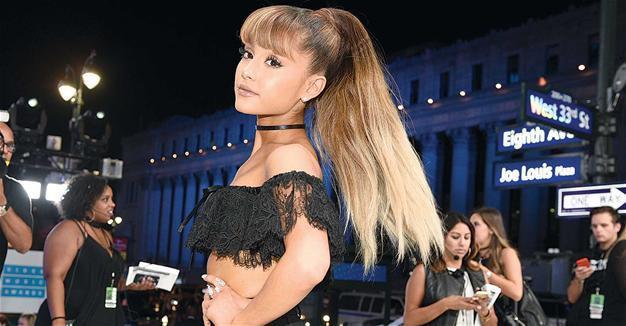Stars to gather in Manchester for benefit gig
MANCHESTER – AFP

U.S. pop star Ariana Grande announced on May 30 she would return to Manchester to headline a star-studded benefit concert for the victims of the deadly May 22 Manchester attack on her show last week.
Justin Bieber, Coldplay, Katy Perry, Miley Cyrus, Pharrell Williams, Usher and Take That will join her for a concert on June 4 in memory of the 22 people who died, seven of whom were children.
“Our response to this violence must be to come closer together, to help each other, to love more, to sing louder and to live more kindly and generously than we did before,” Grande said.
The 23-year-old said she was “broken” and suspended her world tour after the bomb went off near an exit of the Manchester Arena venue at the finale of her show on May 22.
Fans who attended that show will be offered free tickets to the benefit concert at the Old Trafford cricket ground, which has a 50,000 capacity for concerts, with the rest sold to raise money for the affected families.
Grande is a favorite of pre-teens and as well as the children killed, a number of the victims were parents who came to pick up their daughters.
Manchester-born Oasis frontman Liam Gallagher made his solo debut on May 30 with a sell-out concert in aid of the bombing victims.
Like Grande’s, it raised money for the “We Love Manchester Emergency Fund” set up by the local council and the British Red Cross, to help the grieving families and victims.
Ahead of the show starting, 25-year-old Marnie Taylor said she hoped Gallagher would boost everyone’s mood.
“Kind of bring back the gig spirit of what gigs are supposed to be, they’re supposed to be safe, they’re supposed to be somewhere where people can escape,” she said.
Gallagher said it was important to move forward in the wake of the terror attack.
“We need to enjoy life... We’ll be trying to lift people. Otherwise the poor kids who died at the gig have died in vain,” he told the Manchester Evening News.
As life in Britain’s third-largest city resumed a semblance of normality, the train station next to the attack site reopened earlier on May 30.
“There’s still a weird feeling, you know, armed police, a lot of unease,” said 59-year-old David Keys as he got off a train at Manchester’s Victoria.
Troops were deployed at key public sites last week as Britain’s national terror threat was raised to maximum, and police hunted suspected accomplices of bomber Salman Abedi.
The 22-year-old, who was born in Manchester to Libyan parents, was killed in the attack, which was claimed by the Islamic State of Iraq and the Levant (ISIL).
Britain’s threat level was reduced back from “critical” to “severe” on May 27, and the army has been stood down.
Police on May 30 released three men who had been arrested as part of the terror probe, while 11 people remain in custody in Britain.
Abedi’s brother Hashem and father Ramadan have also been arrested in Libya, where authorities say the two brothers were both ISIL jihadists.
Questions are growing over whether intelligence services missed any vital clues, after a report in the Mail on May 28 said U.S. authorities had previously warned Britain’s MI5 intelligence service about Abedi.
British police revealed that Abedi had appeared in police records over theft, receiving stolen goods and assault in 2012, but was never flagged up for any radical views.
“He was known to the police for some relatively minor matters,” Manchester police chief Ian Hopkins told BBC radio, adding: “I am not privy to what the security service did or didn’t know about the individual at this time.”
Abedi reportedly fought in the Libyan conflict to topple former dictator Muammar Gaddafi.
Police released a security camera image of Abedi carrying a large blue suitcase, appealing for any information about where he might have been.
“We are just trying to make sure we capture everything that he has discarded so we can then see what the significance is,” Hopkins said.
“Has it [the suitcase] got DNA on it of people that may have helped him? Has it material he may have used?” Hopkins added.
 U.S. pop star Ariana Grande announced on May 30 she would return to Manchester to headline a star-studded benefit concert for the victims of the deadly May 22 Manchester attack on her show last week.
U.S. pop star Ariana Grande announced on May 30 she would return to Manchester to headline a star-studded benefit concert for the victims of the deadly May 22 Manchester attack on her show last week.